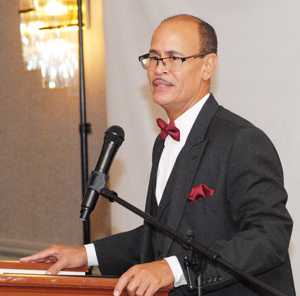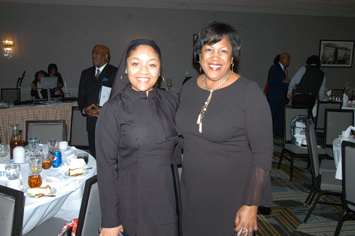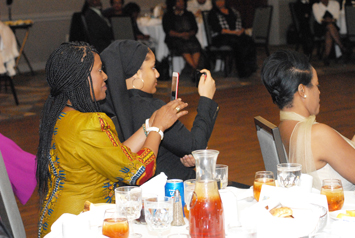The power of unity Student Minister Ishmael Muhammad addresses NAACP State Conference
By La Risa Lynch, Contributing Writer | Last updated: Nov 1, 2019 - 9:54:34 AMWhat's your opinion on this article?

Student Minister Ishmael Muhammad delivered keynote message at Oct. 19 NAACP gathering.
|
“I think you have to invite speakers who are not ashamed to tell the truth and deliver a powerful message,” Ms. Haley said. “Either it is going to wake you up or it’s going to run you away. But I am hoping that it’s gonna wake people up … to join [the NAACP] and be willing to get out on the battlefield...”
Student Minister Muhammad, national assistant to the Honorable Minister Louis Farrakhan, did not disappoint. His nearly hour-long speech—that at times resembled a Baptist sermon—laid out why civil rights activists are needed on the battlefield now more than ever. He challenged the nearly 100 attendees at the October 19 event to be unyielding leaders to truly carry out the nation’s oldest civil rights organization’s mission of social, racial and economic justice. The 83rd Annual NAACP State Conference was held in Oak Lawn, a Chicago suburb.

Nation of Islam Student Minister Kenya Muhammad (left) was among guests at the 83rd Annual NAACP State Conference dinner in Oak Lawn, a Chicago suburb.
|
“The future that we want and desire is in our hands if we are willing to shoulder the responsibility to bring that future into existence without looking for anybody on the outside to do for us that which we are well capable of doing for ourselves, ” Minister Muhammad said.
But a problem exists, he said. A lack of unity exists within the Black community which can impede the struggle for liberation, Minister Muhammad explained. That disunity, he added, clouds the Black community’s ability to identify the real enemy, making Blacks more reliant on a system not designed to be fair to them. His words drew inspiration from the event’s theme “When we fight together, we win.”

Guests at NAACP State Convention dinner take photos.
|
Blacks, he said, get caught up in titles and affiliations to the point where the enemy has become themselves instead of the White supremacy that robs Blacks of their true potential.
“We got to get out of that foolishness. This one is a Jehovah Witness. This one is a Seventh Day Adventist. This one is a Baptist. This one is a Hebrew. This one is a Muslim,”Minister Muhammad said, adding that the enemy doesn’t make those distinctions. “You can get the best education. You can get all the degrees. You can get to the White House and it doesn’t make—excuse the French—a damn difference! Can we just talk honestly for a minute?”
Blacks are perpetrating violence in the community, he said. But to show unity’s power, he used the analogy of a closed fist versus an open hand. The fingers, he said, individually serve different functions—to point, scratch or hold a pencil. Similarly, the nation’s many civil rights organizations fight for many different causes. But those same fingers clenched together to make a fist can pack a power punch against the evils holding Black empowerment back, he said.
“I never seen a fighter punch or box with an open hand; nor have I seen a single cord lift and pull a heavy load. This hand has five fingers but to fight effectively with power, you must close the fingers. As a people you have to close ranks,” Minister Muhammad said.
“If we are going to ball this fist up together, we are going to have to understand—no matter what differences we have—you are my sister and I am your brother whether you like it or not.
That way of thinking is still needed now more than ever. Blacks, he said, still have not gained the fruits from their “460 years of labor and suffering,” even though they protested and marched for the freedom, justice and equality that’s still not been fully recognized.
“After all of this time, we are still at the bottom of everybody else that came to America after we were brought over here in the holds of ships. There is something wrong with that picture,” Mr. Muhammad said. “After all of this time, we are still asking for jobs, justice. Nobody else asks for that.”
He noted the Mexicans, Italians, Polish or other European immigrants have not had to ask for the same. Their identity, culture, and language remained intact, which allows them “to exercise their rights without demanding it from anyone else …,” Minister Muhammad said. The opposite is true for Blacks, brought here on slave ships, robbed of their culture, knowledge, value and history of self, he added.
“They took everything from us, and they denied us the right to know—not for a decade, not for a century, but for three centuries. It was forbidden for the slave to learn. That is a process of total and complete destruction.
“… We [have to] wake up to the reality of what we are up against and what we’ve been dealing with and for us not to have any false expectations thinking that we are going to get something out of this system,” Minister Muhammad said. “Haven’t we’ve learned?”
He commended the NAACP for its works on behalf of Blacks and the poor in the struggle for justice and equal opportunity. But he said, it must rethink the way it organizes.
“I know there is value in the vote. But my question is how many times do we go to our people and ask them to choose between Lucifer and Beelzebub?” Minister Muhammad asked. “We cannot continue to put our hope in a system that has failed us at every turn. We cannot continue to go to our people with the right to vote, to exercise that vote and expect that there is going to be a different result.”
It’s time, he said, that Blacks embrace “do for self” ideology. The Founding Fathers, Minister Muhammad said, did not draft the Constitution with “Pookie” and “Shaniqua” in mind since Blacks weren’t freed until 1863.
"We have to build our community and build a world for ourselves. That means the economics, the politics, the education—everything that it takes for our survival and everything that it takes to sustain a people, we’ve got to give it to ourselves,” Minister Muhammad said.
Minister Muhammad’s speech resonated with Karl A. Brinson, president of the Chicago Westside Branch of the NAACP. “He was on point,” Mr. Brinson said.
Mr. Brinson noted that Minister Muhammad’s speech revealed a lot of truths about the Black community, some of which are known but rarely spoken. He too agreed that discord and the lack of unity within the Black community hurts progress. Blacks, he added, must learn to work “collectively with each other as opposed to being so divisive and separate among each other.” But, he said, those are just words if they are not followed by deeds and actions.
“There has to be a collective united front in recognizing and identifying who our enemy is. He delivered that strong message and I’m hopeful it fell on the hearts and minds of my comrades,” Mr. Brinson said.
INSIDE STORIES AND REVIEWS
-
-
About Harriett ... and the Negro Hollywood Road Show
By Rabiah Muhammad, Guest Columnist » Full Story -
Skepticism greets Jay-Z, NFL talk of inspiring change
By Bryan 18X Crawford and Richard B. Muhammad The Final Call Newspaper @TheFinalCall » Full Story -
The painful problem of Black girls and suicide
By Charlene Muhammad -National Correspondent- » Full Story -
Exploitation of Innocence - Report: Perceptions, policies hurting Black girls
By Charlene Muhammad -National Correspondent- » Full Story -
Big Ballin: Big ideas fuel a father’s Big Baller Brand and brash business sense
By Bryan Crawford -Contributing Writer- » Full Story






 Click Here Stay Connected!
Click Here Stay Connected!








